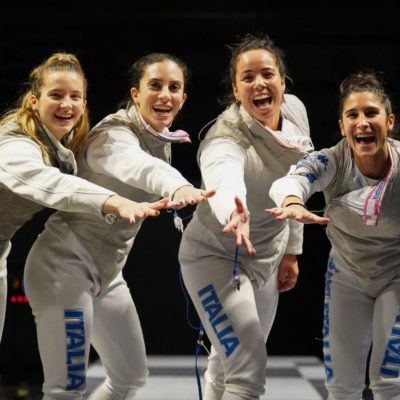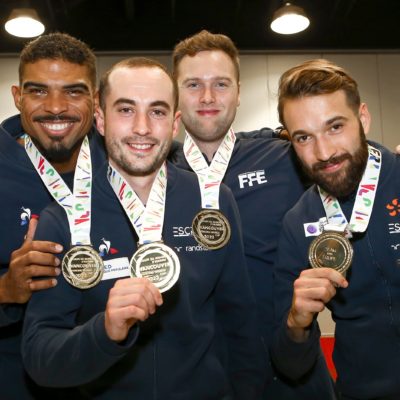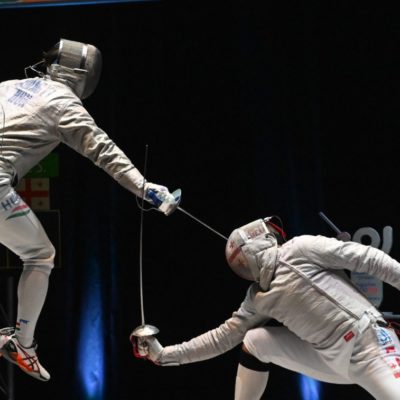The 42nd World Military Fencing Championships begins with Men’s Epee
 |
The overheated sports hall of the Venezuelan Naval Academy Sports – its hot and humid air oppressing the participants and forcing them to drink lots of water to avoid dehydration – with its poorly lit strips provided the scene for the 42nd World Military Fencing Championship whose first two days were dedicated to men’s fencing. Before the bouts started, the organizers asked for a minute of silence in memory of the Polish President who had died a few days earlier in a tragic plane crash.
{sidebar id=1}Under the new rules adopted by the CISM Fencing Committee, the fencers of the twelve three-man teams faced each other in a round robin stage of 35 bouts played to the best of nine hits followed by semi-finals and finals pitching the best four swordsmen. The athletes’ widely different levels of proficiency were apparent from the very first bouts. Confrontations between experienced fencers were characterised by a high degree of skill, each swordsman observing his opponent’s tactics trying to find a weakness and joining battle with a deadly attack. In other cases – i.e. where opponents showed different levels of skill – matches were soon over. The very quick succession of short matches – both physically in view of the testing conditions, and tactically – was apt to be fatal for athletes who were not used to high-level competitions and injuries were a distinct possibility.
Poland Above the Fray
 |
| Zawrotniak (POL) climbs atop the podium for the gold. |
Favourites emerged right from the start, including Switzerland’s Kauter (2006 military world champion) and Heinzer (FIE 19), Verwijlen (NED, FIE 21) and Poland and Italy with fairly homogeneous teams. At the end of day one, the Polish team led Switzerland and Italy in the provisional standings.
Some of the favourite teams – including Switzerland, Poland and Venezuela – consolidated their positions through day 2 of the round robin stage while others lost any chance of a place on the podium. The last one-on-one pitching Poland against Switzerland was likely to decide the title. However, since Poland had won all their bouts, the title was virtually theirs already. The opposition did their level best but the Polish superiority was obvious. The trio – Mikolajczak, Andrzejuk & Zawrotniak – climbed on the highest step of the podium. Switzerland and Venezuela were tied for second place but since the host country had prevailed over the Swiss in their individual confrontation, the locals clinched silver while Switzerland bagged bronze.
 |
In the individual standings, the best four qualified for the semi-finals and fought to the best of 29 bouts. The first semi pitched two Polish fencers, Mikolajczak and Zawrotniak, both left-handed and knowing each other very well, which made for a high-skill confrontation. As attacking fencers, they traded blow for blow, showcasing all good sides of fencing. At the end of the first three minutes, they were tied 4-4. In the second period, Zawrotniak built up a solid 9-6 lead. In the third, the Beijing Olympic team runner-up prevailed 15-8, earning the right to contend in the final. But against whom? The other semi was the exact opposite of the first. Local fencer Ruben Libardo and Bas Verwylen (NED) confronted each other in a fencing style that was made of expectation and a complete absence of attacks. Both fencers were penalised for non-combativity. After two periods, the score was 2-0 in favour of Libardo. The third was to be decisive for the Venezuelan who quickly built an 8-4 and then a 12-6 lead. But the Dutchman came back, on the offense at last. He closed the gap to 14-11 but eventually lost 15-11. Both unfortunate semi-finalists – i.e. Mikolajczak and Verwijlen – climbed on the lowest step of the podium.
A Strange Conclusion
The title was decided between Libardo and Zawrotniak. It was even more boring that the second semi-final. Both fencers were penalised for non-combativity. The score at the start of the third period was 3-1. Things got a little livelier on the strip and in the stands when Libardo led 5-3 with only a few seconds left in the bout. The conclusion was an unbelievable, almost pitiful thriller. Several times, the clock failed to start as the fencers resumed the bout. The situation was utterly confused. Anger was building up in the bleachers while the strip was bustling with activity among the referees and the officials of both teams. Eventually, after countless protests, the scoreboard was reset to 6-6 and the clock to 5 seconds. The Pole scored the last hit and could at last allow his joy to show, along with the entire Polish delegation, who bagged three medals on the first day of competitions. And the Polish harvest was only beginning.





